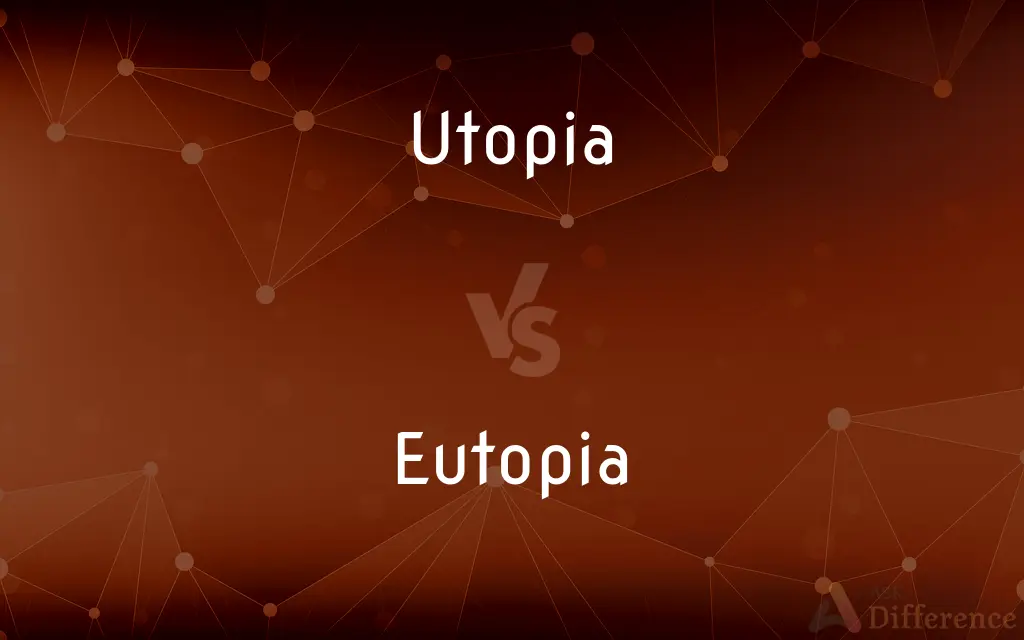Utopia vs. Eutopia — What's the Difference?
By Tayyaba Rehman & Urooj Arif — Updated on March 21, 2024
Utopia embodies an ideal society, while eutopia signifies a good place, focusing on positivity.

Difference Between Utopia and Eutopia
Table of Contents
ADVERTISEMENT
Key Differences
Utopia, a term coined by Sir Thomas More for his 1516 book "Utopia," describes an imagined community or society with highly desirable or nearly perfect qualities for its citizens. On the other hand, eutopia, derived from Greek meaning "good place," is often used to represent an idealistic society that is achievable and grounded in positive attributes.
While utopia is often associated with an idealized society that might be unattainable or exist only in imagination, eutopia suggests a more practical and attainable vision of a society that is fundamentally good and desirable, emphasizing the possibility of achieving such a society.
Utopia is frequently used in literature and philosophy to explore theoretical societies and their workings, serving as a tool for critiquing current societal norms or for envisioning the possibilities of social organization. Eutopia, although less commonly used, focuses on the practical aspects of creating and maintaining a good society, often used in discussions about achievable social reforms and improvements.
The concept of utopia can sometimes carry negative connotations, as it might imply naivety or an impractical approach to social issues, given its perfectionist and often unreachable standards. Eutopia, by contrast, is imbued with a sense of optimism and feasibility, suggesting that while perfection might not be achievable, significant improvements to societal well-being are within reach.
In discussing visions for the future, utopia offers a broad framework for imagining radically different ways of living and organizing society, often without constraints on what is practically achievable. Eutopia, however, is typically invoked to describe visions of the future that are grounded in realism and practicality, focusing on real-world improvements that can lead to a substantially better society.
ADVERTISEMENT
Comparison Chart
Origin
Coined by Sir Thomas More, means "no place"
Greek for "good place"
Concept
Imagined perfect society, often unattainable
Ideal society that is good and achievable
Usage
Theoretical, critiquing or envisioning
Practical, focusing on achievable improvements
Connotations
Idealistic, possibly naive
Optimistic, grounded in reality
Focus
Radical alternatives to current societies
Practical reforms to improve society
Compare with Definitions
Utopia
An imagined place or state of things in which everything is perfect.
The book describes a utopia where everyone lives in harmony.
Eutopia
A concept used in optimistic social planning, aiming for the best possible societal conditions.
His book on urban development presents a eutopia that could be achieved with current technologies.
Utopia
An unrealistic and impractical idea of a perfect society.
While his ideas sound like a utopia, they may not be feasible in the real world.
Eutopia
A term used in contrast to utopia to emphasize practicality and achievability in social reforms.
The movement is not chasing a utopia but a eutopia, where real progress can be made.
Utopia
An ideal or visionary scheme of social and political perfection.
The concept of utopia in her novel challenges readers to rethink their societal values.
Eutopia
An ideal place or state where everything is as good as it possibly can be, within realistic bounds.
The community strives to create a eutopia through sustainable living practices.
Utopia
A fictional setting that presents a perfect society, often used in literature and science fiction.
The film sets in a utopia where there is no crime or poverty, but at a hidden cost.
Eutopia
An achievable society that focuses on the common good and realistic improvements.
The initiative aims to create a eutopia by addressing the root causes of inequality.
Utopia
A hypothetical and idealized society, often used as a critique of existing societal structures.
His speech outlined a utopia that seemed impossible in our current political climate.
Eutopia
A practical vision of a society that maximizes the well-being and happiness of its citizens.
The policy proposal is designed to turn the city into a eutopia for future generations.
Utopia
A utopia ( yoo-TOH-pee-ə) is an imaginary community or society that possesses highly desirable or nearly perfect qualities for its citizens. The term was coined by Sir Thomas More for his 1516 book Utopia, describing a fictional island society in the south Atlantic Ocean off the coast of South America.
Eutopia
A perfect (imagined or hypothetical) society or state of existence; a place of supreme happiness. Also: a literary work describing such a place; a vision of an ideal state of existence.
Utopia
An imagined place or state of things in which everything is perfect
A romantic vision of Utopia
Misplaced faith in political utopias has led to ruin
Eutopia
(medicine) The condition of being properly placed, as opposed to ectopia.
Utopia
Often Utopia An ideally perfect place, especially in its social, political, and moral aspects.
Utopia
A work of fiction describing a utopia.
Utopia
An impractical, idealistic scheme for social and political reform.
Utopia
A world in which everything and everyone works in perfect harmony.
Utopia
An imaginary island, represented by Sir Thomas More, in a work called Utopia, as enjoying the greatest perfection in politics, laws, and the like. See Utopia, in the Dictionary of Noted Names in Fiction.
Utopia
Hence, any place or state of ideal perfection.
Utopia
A book by Sir Thomas More (1516) describing the perfect society on an imaginary island
Utopia
Ideally perfect state; especially in its social and political and moral aspects
Utopia
A work of fiction describing a utopia
Utopia
An imaginary place considered to be perfect or ideal
Common Curiosities
Why is utopia important in literature?
Utopia allows authors to explore and critique societal norms by imagining alternative societies, thereby opening up discussions about possible futures.
Can a society be both a utopia and a eutopia?
While theoretically possible, the term utopia often implies an ideal perfection, whereas eutopia focuses on the best possible state that is realistically achievable, making them conceptually distinct.
Do utopias have to be flawless?
By definition, utopias are often envisioned as flawless societies, but this perfection is part of what makes them theoretically unattainable.
How do utopias critique society?
Utopias often serve as a critique by presenting an ideal that contrasts sharply with existing societal flaws, highlighting areas for improvement.
What is the main difference between utopia and eutopia?
Utopia represents an idealized, perfect society, often seen as unattainable, while eutopia refers to an achievable good place, emphasizing practical improvements.
Can a utopia exist without being a eutopia?
Yes, a utopia can exist as a concept or literary device without being a eutopia, as it doesn't necessarily have to be grounded in achievable reality.
Can a utopia be achieved in reality?
Utopias are often considered theoretical constructs for imagining perfect societies and are generally seen as unattainable due to their idealistic nature.
How does eutopia relate to social reforms?
Eutopia is closely tied to social reforms as it represents a vision of society that focuses on achievable improvements and the well-being of its citizens.
Is eutopia a commonly used term?
Eutopia is less commonly used than utopia but serves an important role in discussions about realistic and achievable societal improvements.
Is it better to strive for a utopia or a eutopia?
Striving for a eutopia might be more practical and beneficial as it focuses on achievable improvements, whereas aiming for a utopia could lead to disappointment due to its idealistic and unattainable nature.
Are all eutopias utopias?
Not necessarily; while all eutopias are ideal in some sense, they are specifically focused on being good and achievable, which may not align with the more idealized and often unattainable visions of utopias.
Can literature help create a eutopia?
Literature can inspire and influence social changes by presenting visions of eutopias, thereby contributing to efforts to improve society.
Is there a perfect utopia?
While the concept of a perfect utopia is central to the term itself, the subjective nature of perfection means that what constitutes a utopia can vary greatly between individuals and cultures.
Share Your Discovery

Previous Comparison
Luxe vs. Lux
Next Comparison
Appliance vs. DeviceAuthor Spotlight
Written by
Tayyaba RehmanTayyaba Rehman is a distinguished writer, currently serving as a primary contributor to askdifference.com. As a researcher in semantics and etymology, Tayyaba's passion for the complexity of languages and their distinctions has found a perfect home on the platform. Tayyaba delves into the intricacies of language, distinguishing between commonly confused words and phrases, thereby providing clarity for readers worldwide.
Co-written by
Urooj ArifUrooj is a skilled content writer at Ask Difference, known for her exceptional ability to simplify complex topics into engaging and informative content. With a passion for research and a flair for clear, concise writing, she consistently delivers articles that resonate with our diverse audience.














































